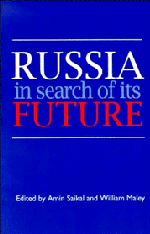Book contents
- Frontmatter
- Contents
- Preface
- Notes on Transliteration
- 1 Introduction
- Politics
- Economics
- International Relations
- Culture and Society
- 10 Culture in Russia and Russian Culture
- 11 Reconstruction, Deconstruction and the Restoration of Literature in Russia
- 12 Alternative Visions of the Russian Future
- Conclusion
- Notes on contributors
- Index
12 - Alternative Visions of the Russian Future
Published online by Cambridge University Press: 03 May 2011
- Frontmatter
- Contents
- Preface
- Notes on Transliteration
- 1 Introduction
- Politics
- Economics
- International Relations
- Culture and Society
- 10 Culture in Russia and Russian Culture
- 11 Reconstruction, Deconstruction and the Restoration of Literature in Russia
- 12 Alternative Visions of the Russian Future
- Conclusion
- Notes on contributors
- Index
Summary
For as long as any of us can remember the juxtaposition of a ‘strong state’ and a ‘weak society’ has been a key concept in the analysis of Russian and Soviet history and politics. Articulated, this concept stood for: an authoritarian, bureaucratic and centralised administration; state control of public association, interest group activity and local government; a major degree of state control over the media, education and culture (for example through a ‘state ideology’); a major degree of state ownership and control of the economy and disposal of its surplus; the downgrading of law and constitutionalism as impediments to state power; and in general the inhibition of ‘civil society’ and its replacement by state programmes of ‘mobilization’ and ‘state-building’ from above, such that society seemed to have lost much of its capacity for spontaneous evolution and the state appeared to manage such social change as there was.
Clearly the forces unleashed by Gorbachev's perestroika, the collapse of the Soviet communist system and of the Soviet Union itself have dealt a massive blow to the ‘strong state’ in this familiar sense. Witness the two successive elected parliaments that have gone out of their way to defy the executive; the regions of Russia that have declared their autonomy or ‘sovereignty’, and (more serious) the refusal of many to pay their taxes; the President's inability to control the printing of money; the surge in crime and sporadic public violence; or the activities of warlords and private armies, not (so far) within Russia itself, but sometimes organised from inside Russia.
- Type
- Chapter
- Information
- Russia in Search of its Future , pp. 190 - 206Publisher: Cambridge University PressPrint publication year: 1994



